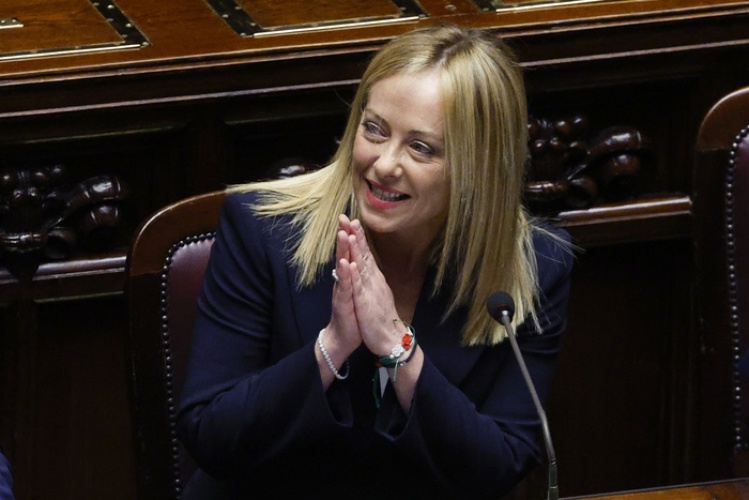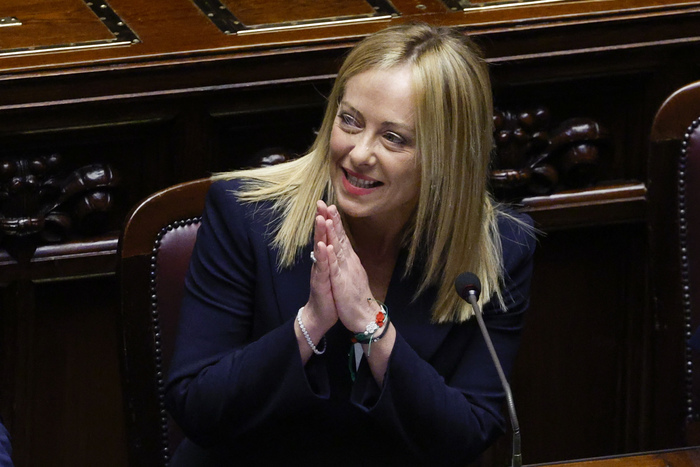In a keynote address on Tuesday, Italy’s first female Premier Giorgia Meloni said that she is an underdog; one who will beat the odds again in achieving her policy goals, including energy hike curbs, continued support of Ukraine, and cleaving to the EU and NATO line.
She also stressed that she had no sympathy for Fascism, and that Italy’s racial laws were the lowest point in its history.
The situation in Italy does not “permit losing time”, she said in her first address to parliament, laying out her five-year agenda and addressing current emergencies like the energy crisis ahead of a confidence vote in the House Tuesday, and the Senate on Wednesday, which will bring her government's power to fruition.
Saying that she was “emotional due to the solemnity of the moment,” Meloni thanked President Sergio Mattarella for his “precious advice” upon taking office. Mattarella tapped Meloni as premier after she led Fratelli D’Italia (FdI) and the rightwing coalition to a landslide win in the September 25 general election.
”This is a fundamental moment for democracy, thank you,” she told the Lower House where FdI, Lega and Forza Italia now have the majority.
Meloni, 45, thanked her rightwing coalition partners for enabling her to name a government in near-record time.
She said they had led to the formation of a government “in one of the shortest periods of time in history”.
Italy’s first woman premier also thanked her predecessor Mario Draghi for enabling a swift passage of power, even though “ironically” FdI had been the sole opposition force against him, and said her most heartfelt thanks were for the Italian people, “the only sovereign.”
She added that she felt on her shoulders “the weight of being Italy’s first female premier”.
Meloni went on to say that “some people may not like some of our proposals, but we will keep our pledges.”
She said she was looking at a 10-year horizon and was determined to change Italy even if it meant not being re-elected in 2027.
In a dig at some foreign countries who have said they will remain “vigilant” over the moves of a rightwing government, Meloni said:
“Those who want to stay vigilant are not respecting the Italian people.
“Italy is part of the West, the cradle of freedom and democracy.”
Meloni said her government would always put national interest first and stressed,
“We don’t want to sabotage the EU but to make it more effective”.
She said “Italy will be inside the EU institutions” and “we will respect the rules and will contribute to change”.
She also thanked the men and women who had given their lives on international missions saying “the homeland will always be grateful” to them.
Turning her attention to the energy crisis, Meloni said the sea had gas deposits “that we must fully exploit”.
She said that the government aimed to give an “imposing” support to the energy sector and help Italians pay their bills, while some measures would have to be put off.
She said energy burdens should be shared in a “more balanced” way internationally.
Meloni added that Italy, in particular the south, was “the paradise of renewable energy sources with its sun, wind, the heat of the Earth, the tides and rivers. A patrimony of green energy too often blocked by bureaucracy and incomprehensible vetoes.
“In other words, I am convinced that Italy, with a little courage and practical spirit, can emerge from this crisis stronger and more autonomous than before.”
Meloni also said that Ukraine’s freedom “can’t be bartered with our own”, and that Italy would not give in to Russian President Valdimir Putin’s blackmail regarding energy.
She reiterated that Rome was firmly in the EU and NATO camp.
Next she stressed that there would be “concrete measures against inflation in the budget”, that the European Central Bank’s gamble on rates was hitting citizens and businesses hard; that investing in Italy could be a “good deal”, and that the EU-funded post-COVID National Recovery and Resilience Plan was a “great opportunity which we must exploit to the fullest.”
She said Italy would negotiate “adjustments” to the NRRP to reflect the energy crisis and would push ahead without waste, while cutting debt with structural growth.
In other remarks, Meloni said Italy needed a presidential reform; that “we will give Rome the powers and resources worthy of a capital”; that “we will press on with differentiated autonomy; and that “I will not give up on reforms due to prejudicial opposition.”
She announced “flexible” budget moves on early retirement and said that the pension system must also safeguard young people.
Meloni also said that the ‘citizenship wage’ basic income (RdC) was “not the solution, but jobs are.”
She said that the government would give support to those who can’t work but that the basic income was a “defeat”.
On her new ‘birth rate’ brief for the family ministry, Meloni said the aim was to “support families, and launch a plan against the demographic glaciations” of Italy, the country greying amid ever falling birth rates.
She promised to make nursery facilities free of charge and keep them open until late to help working mothers.
In other remarks, Meloni said that she had never felt any sympathy with any regime, including Fascism, and would feel sympathy for “the young people who will protest against us in the street”.
Meloni said the anti-Jewish Fascist race laws were “the lowest point in Italian history”.
Addressing fears on abortion and gay rights, she said “we will never limit existing rights”.
She also said the government would be on the front line against the “cancer” of the Mafia.
Meloni said the government would crack down on illegal immigration while passing a decree on legal flows.
Deflecting references to her recent call for a naval blockade against migrants from North Africa, she said that blockade was already being enforced by the EU’s Sophia Mission.
Meloni described herself as an “underdog”, in English, for the mammoth tasks facing her, and in being Italy’s first woman prime minister, but promised to “upset the forecasts again” as she had done in leading FdI to 26 per cent in the general election from 4 per cent four years previously.
She ended her speech by quoting Saint John Paul II’s saying “freedom does not consist of doing what we want, but in having the right to do what we must.”











